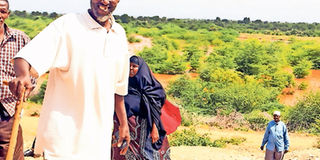Climate change isn't just an environmental issue - it is a justice issue too

Farmers next to a flooded farm in Mandera. Most farmers along River Dawa counting loses after their farms were submerged by the swollen river due to heavy rains in Ethiopia. PHOTO | MANASE OTSIALO | NMG
What you need to know:
- Agriculture, the backbone of many African economies, is under siege from erratic rainfall patterns, prolonged droughts and devastating floods that are disrupting traditional farming practices and decimating livelihoods.
- Small-scale farmers, who constitute a significant portion of the African population, bear the brunt of these shocks.
Climate change is often framed as an environmental issue, a challenge for scientists and ecologists to solve. While this is undoubtedly true, it is increasingly evident that climate change is fundamentally a justice problem. It is a problem of equity, fairness, and unequal distribution of burdens and benefits.
Climate justice recognises that the impacts of climate change are not evenly distributed. Those who have contributed the least to the crisis often suffer the most. Island nations face the threat of disappearing altogether while coastal cities grapple with rising sea levels.
Extreme weather events, from droughts to floods, disproportionately affect marginalised communities. The Global South, home to the world's poorest and most vulnerable populations, bears the brunt of climate-induced disasters despite minimally contributing to global greenhouse gas emissions.
Heat waves' escalating frequency and intensity in urban areas are exposing cities such as Lagos, Nigeria, and Nairobi, Kenya to unprecedented heat stress. These extreme temperatures disproportionately affect the urban poor, who often reside in densely populated areas with limited access to cooling infrastructure. The elderly, children and those with underlying health conditions, are particularly vulnerable.
Agriculture, the backbone of many African economies, is under siege from erratic rainfall patterns, prolonged droughts and devastating floods that are disrupting traditional farming practices and decimating livelihoods. Small-scale farmers, who constitute a significant portion of the African population, bear the brunt of these shocks.
In the Sahel region, where desertification is advancing rapidly, climate change is acting as a threat multiplier where conflicts over scarce resources are intensifying. Coastal communities in countries like Nigeria and Mozambique are facing displacement and economic hardship due to sea-level rise and coastal erosion. These challenges disproportionately affect women and girls, who often bear the responsibility of providing food, water and care for their families.
Due to changing climatic conditions, malaria, dengue fever and other vector-borne illnesses are expanding their geographic range. These diseases immensely strain already fragile health systems, particularly in rural areas.
This intersection of climate change and existing social, economic and political inequalities demonstrates a complex web of injustices. The myriad ways climate change disproportionately impacts vulnerable populations underscores an urgent need for a climate justice framework that places equity and fairness at the core of climate action. Addressing climate change without considering its differential impacts on diverse communities is not only ineffective but also morally questionable.
The concept of climate justice encompasses a wide range of issues. It seeks to ensure that the transition to a low-carbon economy is just and equitable, protecting the rights of workers and communities dependent on fossil fuels. It calls for redistributing resources and power to marginalised groups disproportionately affected by climate change. It also demands that decision-making processes be inclusive and participatory, giving a voice to those often excluded from the political arena.
At the heart of climate justice are six key pillars.
First, a just transition ensures that the shift to a green economy benefits all, especially workers in carbon-intensive industries. It requires policies that support job creation, retraining, and social safety nets.
Second, social, racial and environmental justice are interconnected. Climate policies must address systemic inequalities and prioritise the needs of marginalised communities.
Indigenous climate action recognises the vital role of indigenous people as stewards of the land and holders of invaluable traditional knowledge.
Community resilience and adaptation focuses on building the capacity of communities to withstand and recover from climate impacts.
Natural climate solutions harness the power of nature to mitigate climate change, such as protecting forests and restoring ecosystems.
Finally, climate education and engagement are essential for fostering a climate-conscious society and empowering individuals to take action.
Climate justice aims to achieve equitable access to natural resources, clean energy, and healthy living environments. This means ensuring that everyone has the right to breathe clean air, drink clean water and live in a safe and sustainable environment. It also implies a fair distribution of the benefits of climate action such as green jobs and renewable energy access.
To realise climate justice, several critical principles must guide our actions. These include respecting and protecting human rights, supporting the right to development for all, sharing benefits and burdens equitably, ensuring participatory, transparent, and accountable decision-making, promoting gender equality and equity, harnessing the transformative power of education, and fostering effective partnerships.
Climate change has a profound moral and ethical impact, and addressing it requires a fundamental shift in our values and priorities.




